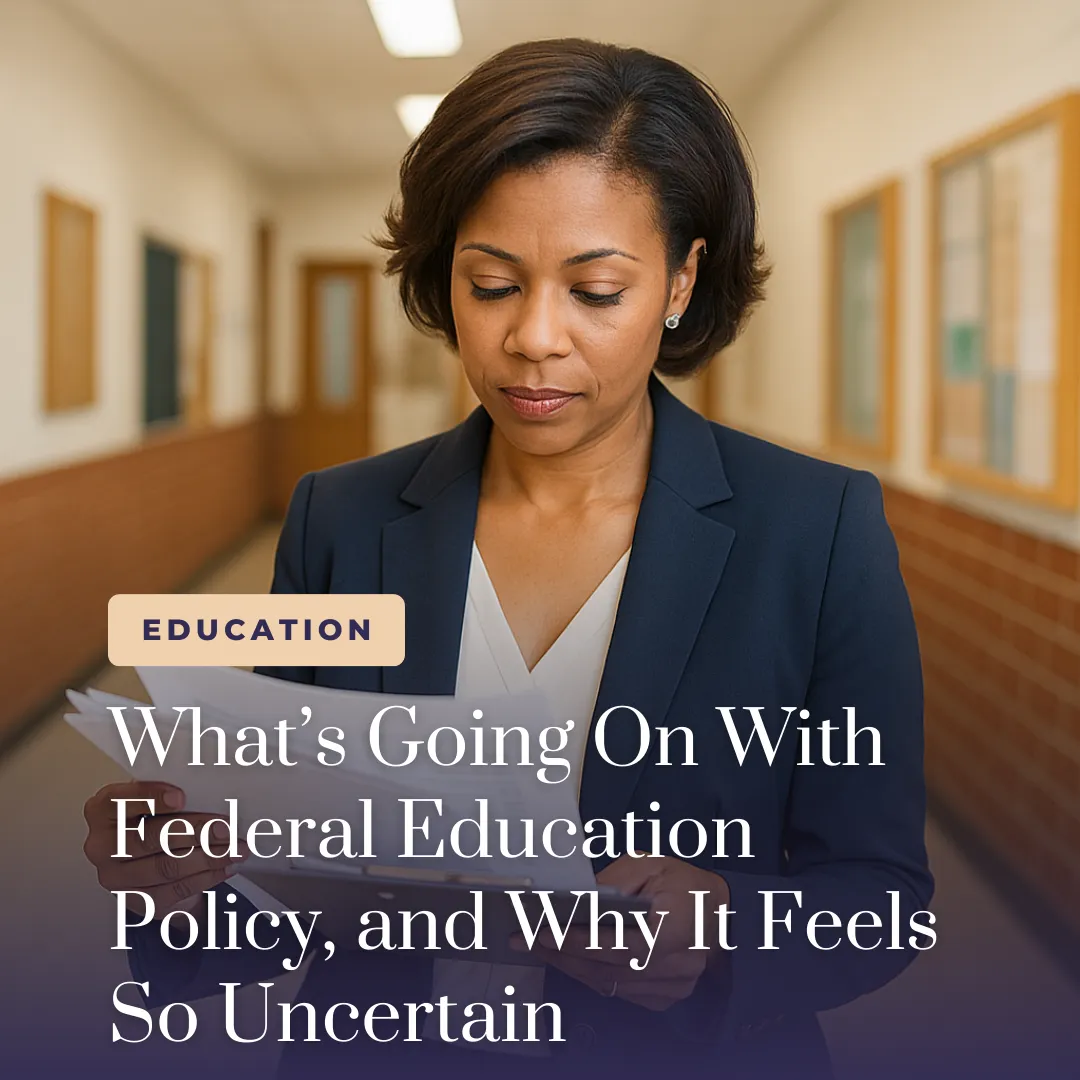
What’s Going On With Federal Education Policy—and Why It Feels So Uncertain
What’s Going On With Federal Education Policy and Why It Feels So Uncertain
A quick recap from EdWeek’s recent webinar for school and district leaders
If the recent headlines and funding delays have you feeling unsure about what’s next, you’re not alone. I attended a webinar hosted by EdWeek Market Brief called “Making Sense of the Trump Administration’s K–12 Policies,” and it helped put some of the big-picture shifts into focus.
Here’s a simple breakdown of what’s happening at the federal level and what it could mean for your school or district.
Budget Season, But Still No Final Numbers
Usually by now, schools have a pretty clear idea of how much federal funding to expect. But this year, districts are still waiting on final numbers for key programs like Title II and McKinney-Vento.
That’s because of how late the federal budget was finalized and because there’s some debate about whether the administration can move money between programs. Until that’s settled, some funding streams are still up in the air.
💡 What to do: If your team is holding off on big decisions, you’re not behind. Everyone is in “wait and see” mode. Build flexibility into your budget where you can.
New DEI Certification Letter Is Causing Confusion
The U.S. Department of Education recently sent states a letter asking them to certify that districts aren’t engaging in discriminatory practices, specifically around race. The letter is tied to the Supreme Court’s decision in Students for Fair Admissions v. Harvard (a college admissions case), but the Department is applying that interpretation to K–12 education.
What’s the problem?
The language is vague, and there’s no clear definition of what counts as “illegal DEI activities.” Some states have signed it, others are pushing back, and many are still trying to figure it out.
💡 What to do: Some districts are reviewing their curriculum, lesson plans, and library materials to avoid compliance issues. It’s worth checking how your state is responding and keeping an eye on any changes to OCR (Office for Civil Rights) enforcement.
ESSER Extensions Were Pulled Back, and It’s Impacting Schools
Here’s a big one: The Department of Ed had approved extensions for districts to use leftover ESSER funds but then suddenly took them away.
That reversal caused immediate disruptions:
In Maine, over 100 teachers lost reimbursements for supplies.
In Illinois, dozens of PD and support contracts were canceled.
In some places, tutoring and SEL services stopped mid-April while districts figured out what was still covered.
Now, 16 states and D.C. are suing the federal government, claiming the policy change violated grant procedures.
💡 What to do: If you were relying on extended ESSER funds for anything this summer, double-check what’s still covered. Many districts are scaling back or pausing while they wait for legal clarity.
Research Contracts Got Cut, and That Has Ripple Effects
The Department of Education has canceled more than 50 research contracts, including a large number under IES (Institute of Education Sciences). These contracts supported:
Long-term studies
Evidence-gathering
Technical assistance
Without them, it may be harder to find updated, high-quality research, especially around new tools, programs, and interventions.
💡 What to do: If you’re trying to document “evidence-based” practices, especially for grants, be aware that data might be harder to find in the near future.
What About Title I, IDEA, and Other Federal Funding?
There are two major things to watch:
FY26 Budget Talks:
We’ll start to see funding proposals in May. Expect to see some scary cuts at first, but experts say they’re mostly negotiation tactics, not final numbers. Most predict level funding for major programs like Title I and IDEA.Reconciliation Process:
This is a separate track that could cut things like Medicaid and school nutrition programs. That might indirectly affect services in schools, especially special ed reimbursements and family supports.
💡 What to do: Don’t panic, but stay tuned. Funding for Title I and IDEA is likely to hold. Be cautious with programs tied to Medicaid or school-based nutrition.
One More Thing: Don’t Hit Pause on Professional Learning
With everything up in the air, funding questions, shifting policies, and leadership pressures, it’s tempting to put professional development on the back burner.
But here’s what we’re hearing from schools we support:
The right PD right now helps educators feel more confident, clear, and prepared.
At Uncomplicate Ed, we’re helping schools make smart, low-stress decisions by offering:
Flexible PD formats that fit your calendar and your staff needs
Research-based training that aligns with evolving policy and funding guidelines
Plug-and-play resources (like PD in a Box®) that make it easy to support your teachers, even on short notice
You don’t have to cancel PD. You just need the right kind.
We’re here to help.
➡️ Learn more about PD in a Box®
or Talk with our team about what would work best for your school or district.
Final Thoughts
This is a season of uncertainty but also an opportunity to refocus. Federal policy may be shifting, but your mission hasn’t changed. You’re still here to lead with clarity, support your staff, and meet student needs.
We’ll continue to unpack what’s happening in D.C. and provide straightforward updates and resources. If this helped simplify things for you, feel free to share it with your team.
Let’s uncomplicate what we can do together.
At Uncomplicate Ed, we believe in using smart tools to save educators time, including AI. This post was created using AI support for research and first-draft writing, then reviewed, revised, and personalized by Ashley Doty.

